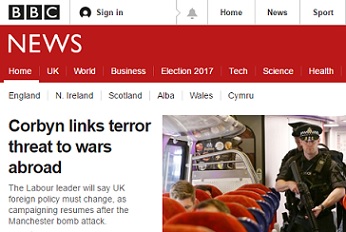After the Manchester attack – assessing trust, bias, and media responsibility
 This time the US media is in trouble for real news. Following the dreadful events in Manchester on Monday evening, the New York Times has published sensitive photographs and documents which, it is feared, might compromise the ongoing investigations into the bombing. The source is said to be from within the US security services – but the question of media responsibility again raises its head.
This time the US media is in trouble for real news. Following the dreadful events in Manchester on Monday evening, the New York Times has published sensitive photographs and documents which, it is feared, might compromise the ongoing investigations into the bombing. The source is said to be from within the US security services – but the question of media responsibility again raises its head.
The NYT has been widely condemned in the British media: yet, as Hacked Off’s Brian Cathcart pointed out in a column last week, mainstream US journalists have in recent times been standard-bearers for the profession, in the face of a lot of pressure from government and commentators.
Indeed, in this country, The Reuters Institute Digital News Report 2016 found that, although “news brands have a strong heritage and reasonable levels of trust,” scandals such as phone hacking have eroded trust in journalists who work for UK newspapers.
At the same time, television journalists (who are required by UK regulator Ofcom to present unbiased news) are considered more trustworthy than print journalists.
This observation was backed up by a YouGov poll commissioned last year by 38 Degrees (the not-for-profit political-activism organisation) which showed that “given a choice of seven different news organisations including Sky News, ITV News and Channel 4 News, 58% of respondents ranked the BBC first for balanced and unbiased reporting. Sky News was second, with 15%.”
When non-broadcast media was also included, the BBC was also trusted by over half the population, while newspapers were third, with 11%, behind family members (just 18%).
Interestingly, trust does not appear to be the sole driver of usage: while only 5% of the sample trusted social media, 51% said they use it as a source of news each week.
“Around one in ten (12%) say it [social media] is their main source. Facebook is by far the most important network for news. More than a quarter of 18–24s say social media (28%) is their main source of news – more than television (24%) for the first time.”
Back in the US, a 2014 Pew Research Centre study highlighted in a recent article in Business Insider showed that the “BBC and The Economist top the list of outlets that are trusted by every ideological group”, while the big US newspapers were trusted by most. Given the presidential election and the spectre of fake news, it is likely that US sources such as the NYT and the Washington Post are more trusted – at least by non-Republicans – than previously.
Indeed, as Cathcart points out in his column, sales of the NYT and the WP have been rising since Trump’s election, while sales of their UK equivalents have been falling. Conversely, trust in the UK broadcast media seems to be rising, while – according to the Pew Research report – US broadcast media is much less trusted than its print counterparts.
In a speech that was widely reported as a “roasting of Donald Trump”, Muslim-American comedian Hasan Minhaj actually gave a considered view of the state of journalism in his speech to White House correspondents at their annual dinner. He posited the notion that we are “living in this strange time where trust is more important than truth… I just think that a lot of people don’t trust you [journalists] right now. And can you blame them?” His ire was aimed at the US broadcast media: he name-checked Fox News, MSNBC and CNN.
He went on that journalists “have to be more perfect than ever. Because when one of you messes up, he [Trump] blames your entire group. So now you know what it feels like to be a minority.”
If he is right – and the circulation and audience figures for the NYT, Economist, BBC News and other trusted sources suggests he is – trust will be crucial in rebuilding the fortunes of the news media. Gaining trust is a long hard road, with many potential mis-steps. There are no easy answers to the questions of trust and responsibility which surround.
But UK newspaper journalists and their editors could do worse than look at the BBC and US print media as models to turn around their falling reputation. And US broadcasters could do the same.
The news media needs to win back trust. Fortunately, there are enough models to show this is viable, if the spirit is willing.